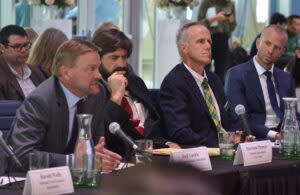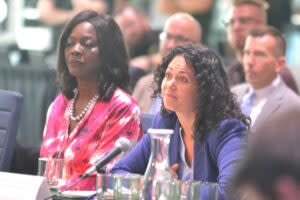A U.S. Senate committee hearing on Aug. 15, 2024, at Grand Farm near Casselton, North Dakota, included, from left, Tina Smith of Minnesota, John Boozman of Arkansas, John Hoeven of North Dakota, and Amy Klobuchar of Minnesota. (Jeff Beach/North Dakota Monitor)
CASSELTON — While hosting a congressional field hearing, Greg Tehven, one of the founders of North Dakota’s Grand Farm, called on the federal government to honor its financial commitments in a timely manner.
“It was very uncomfortable sitting in this room and telling my board of directors that we needed a loan to make payroll,” Tehven testified before the Senate panel on Thursday. “And when you have a $1.4 million of accounts receivable, it’s really challenging.”
Tehven said Grand Farm had earned that $1.4 million through federal contracts.
“I would encourage all of you to work with the federal agencies to increase the efficiency … and ensure that we are paid in a timely way,” Tehven said.
Tehven was part of a panel that provided testimony to four members of the Senate Agriculture Appropriations Committee at Grand Farm’s Innovation Campus west of Casselton. The field hearing was organized by Sen. John Hoeven, R-N.D., and included Sen. John Boozman, R-Ark., and Minnesota’s Democratic senators, Amy Klobuchar and Tina Smith.


A theme of the hearing was a need to invest in more agricultural research and the importance of public-private partnerships, such as Grand Farm.
Tehven said when the North Dakota Legislature committed $10 million to help launch Grand Farm, legislators were expecting private investors. He said what they didn’t anticipate was the out-of-state investment from Farm Credit Services of America out of Nebraska, Colorado-based CoBank and equipment manufacturer AGCO.
“It sent the signal that this collaboration works,” Tehven told the panel.
There also was discussion of the need for government to be more efficient.
Boozman said U.S. Department of Agriculture loan and grant applications are seen as too complicated and the process takes too long. He said a small community can’t afford to hire a grant writer.
USDA Deputy Secretary Xochitl Torres Small said loan applications for farmers have been cut from 29 pages to 13.
“We have to work to be a better partner to farmers and everyone who relies on USDA,” Torres Small said.
She said it was recently announced farmers can apply for loans online and be guided to what loan product will best fit their needs. It’s also the first year they can make loan payments online.
“To not have to drive into an FSA (Farm Service Agency) office — though you can if you want to — is huge,” she said.


Chavonda Jacobs-Young, the USDA’s under secretary for research, education, and economics, spoke of the need to fund technology to support ag research.
“We have to have broadband, we have to have high-powered networking systems to move that data to and fro, to analyze, to share the high-performance computing,” she said.
North Dakota State University Vice President for Agricultural Affairs Greg Lardy advocated for a national database of ag research. “It’s critical that we develop a more robust database and a way to analyze that,” he said.
Josh Gackle farms near Kulm in southeast North Dakota and is president of the American Soybean Association. He noted that farmers contribute to ag research, trade expansion and transportation infrastructure through checkoffs – collecting a small percentage from each sale of soybeans.
“It is concerning to us that U.S. federal ag research funding has declined while other countries have maintained or increased their funding levels,” he said.
SUBSCRIBE: GET THE MORNING HEADLINES DELIVERED TO YOUR INBOX
Source link : http://www.bing.com/news/apiclick.aspx?ref=FexRss&aid=&tid=66bea67b81454d8c92703c00ee51774b&url=https%3A%2F%2Fnews.yahoo.com%2Fnews%2Fcollaboration-government-efficiency-highlight-us-222124809.html&c=11129412751391321934&mkt=en-us
Author :
Publish date : 2024-08-15 11:21:00
Copyright for syndicated content belongs to the linked Source.